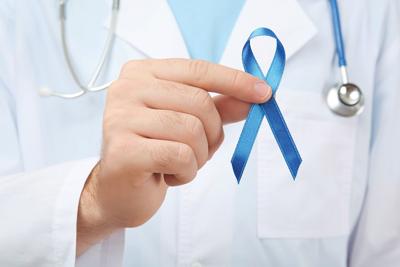
March is Colorectal Cancer Awareness Month, which gives us an opportunity to learn preventive measures that can reduce cases of this common disease in the United States. Discussing cancer can be difficult, but it’s important to educate ourselves about risks and warning signs. It’s also a good idea to learn what to expect at your first colon cancer screening.
Lowering risk
When it comes to colorectal cancer, most are familiar with its respective screening procedure: the colonoscopy. Dr. Siddhartha Shah, a practicing gastroenterologist with thirty-two years of experience, notes that the significance of screenings was evident from early findings. “Early detection of polyps reduced the eventual development of colon cancer and therefore saved lives,” says Shah, who knows that most people aren’t excited to schedule routine screenings. “There’s a general reluctance.” That reluctance, he believes, comes from not knowing what to expect from the procedure and fear of the result.
The preparation phase of a colonoscopy is often considered the most challenging as it requires limited diet and drinking specific formulas to cleanse the colon (which means you likely can’t make plans that day). Because Shah uses a colonoscope with a tiny camera to examine the colon lining for any polyps, he says, “the better the prep, the better the exam.” Most patients are sedated throughout the typically twenty-minute procedure.
Risks associated with colon cancer vary depending on personal and family histories as well as demographics. It’s recommended that average-risk adults get their first colon cancer screening at age forty-five. Shah says the age recommendation was recently lowered from fifty due to evidence suggesting that colon cancer is becoming more prevalent in younger populations. Regardless of age or previous screening, colonoscopies may also be necessary for patients experiencing symptoms that could indicate cancer. It can be challenging to differentiate between gastrointestinal diseases and cancer, Shah notes, but ongoing rectal bleeding, anemia, or weight loss are signs that warrant a call to your gastroenterologist.
Alternative options for colon cancer screening
You may have seen advertisements for at-home screenings to use in place of colonoscopies. Shah advises against these alternative options, emphasizing that colonoscopies are “the gold standard.”More importantly, he notes,if patients get a positive result from an at-home test kit, they will still need to follow up with a colonoscopy. At-home tests should only be considered for patients otherwise unable to get colonoscopies. In those cases, he reasons, “some screening is better than no screening.”
Having other GI issues?
Change in bowel movements is a common gastrointestinal complaint among older adults, says Shah. This can be due to the introduction of medications to the body or a patient’s general mobility. “They can [also] have weakness in sphincter muscles leading to problems with incontinence,” he adds
Another common gastrointestinal concern among older adults is Barrett’s esophagus, which is esophogeal damage often brought on by acid reflux; gastroenterologists check for it with a procedure similar to colonscopy. “Seniors with long-standing reflux should be screened for Barrett’s esophagus,”Shah notes, because the acid that presents with reflux can cause precancerous changes to the esophageal lining.
Cancer screening is always necessary and recommended, but awareness months encourage us to prioritize our health. Colonoscopies aren’t as bad as most people assume and are critical tools for early detection of colorectal cancers. If you’re reading this and thinking of a persistent GI issue you haven’t addressed, call your gastroenterologist! And if you are forty-five years or older and have yet to be screened for colon cancer, schedule it now.
Olivia is a freelance writer based in Buffalo, NY. She is a contributor to Buffalo Spree and Forever Young. contactoliviaguthrie@gmail.com











(0) comments
Welcome to the discussion.
Log In
Keep it Clean. Please avoid obscene, vulgar, lewd, racist or sexually-oriented language.
PLEASE TURN OFF YOUR CAPS LOCK.
Don't Threaten. Threats of harming another person will not be tolerated.
Be Truthful. Don't knowingly lie about anyone or anything.
Be Nice. No racism, sexism or any sort of -ism that is degrading to another person.
Be Proactive. Use the 'Report' link on each comment to let us know of abusive posts.
Share with Us. We'd love to hear eyewitness accounts, the history behind an article.